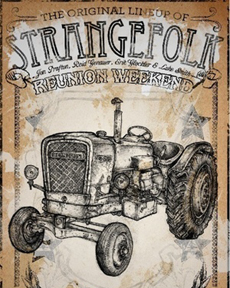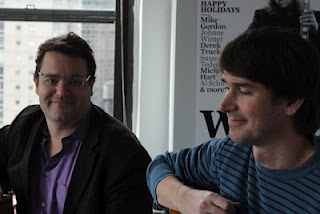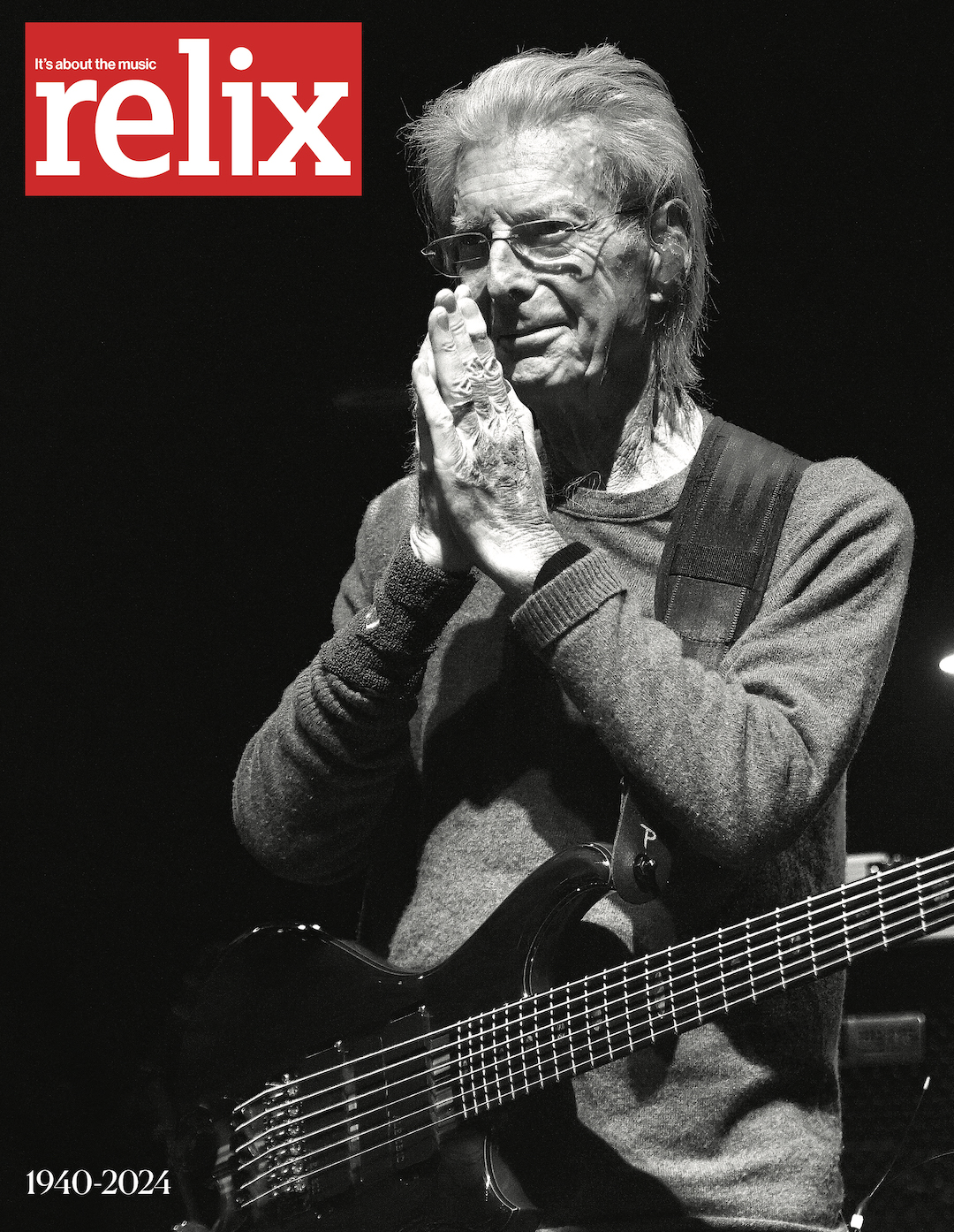“Stout Hearted”: Reid Genauer’s Return to Strangefolk

After 11 ½ years, tonight is finally the night. The original Strangefolk quartet will take the stage once again, as the group opens a four show tour at Brooklyn Bowl. The group began in 1991 at the University of Vermont where fellow students Reid Genauer and Jon Trafton first performed together on a patch of grass outside their dorms. A bit later they enlisted Luke Smith on drums and Erik Glockler on bass to form a band that blended songwriting chops with an improvisational spirit. Over the course of the ensuing decade, Strangefolk built a fervid fanbase, created the vibrant Garden of Eden festival and signed a record deal with Mammoth. Then, during the summer of 2000, Genauer announced he would be leaving the band to pursue a graduate degree at Cornell University. Some feelings were hurt and frustration ensued.
Trafton, Glockler and Smith soon recruited a new Strangefolk lineup (Smith would depart in late 2003), while Genauer eventually resurfaced after graduation with a new group he dubbed Assembly of Dust. Trafton and Genauer then embarked on parallel journeys even as many of their fans held out hope that their paths might intersect once again. Such faith was rewarded this past January when the reunion gigs were announced, facilitated by the earnest entreaty of a longtime band booster, club owner Peter Shapiro (Brooklyn Bowl, Capitol Theatre, Wetlands Preserve).
In the following conversation Genauer looks back on Strangefolk’s history, shares what the reunion means to him and discusses some classic songs that appear on the group’s new archival release, Live at The Capitol Theatre, 12/27/98.
For another perspective on these events, check out the interview with Jon Trafton on Jambands.com.
So this all was put in motion through an invitation from Peter Shapiro for the original Strangefolk to appear at the Capitol Theatre when he re-opens the club later this year. Can you talk a bit about that conversation?
Well from Pete’s perspective, I’d imagine he was thinking, “Hey, I’m going to reopen the Capitol and it wouldn’t it be great to see my old friends on stage together? Wouldn’t the combination of these things be fun?” Pete’s got a lot of emotional equity in Strangefolk. We played Wetlands many, many times and we spent a lot of time just getting to know each other. It’s a great thing when the people you work with have emotional connections, so he is definitely emotionally invested in seeing this happen. And in the absence of anybody else taking the helm, he got everybody on the phone and said, “Pick up your toys and let’s play.” (laughs)
There were a couple conversations but the one that inked the deal, so to speak, was when he more or less gave us a rock and roll sermon that lasted all of 35 seconds, concluded that he was right and then hung up on all of us (laughs). We were left on the phone trying to figure out what was agreed upon. It was comedic.
What people might not realize is that Peter made the trek from NYC up to Vermont to see Strangefolk a number of times, including some Eden appearances. He just really enjoyed his Strangefolk.
He did. He was a big part of it. He was our Bill Graham or our Ken Kesey or some odd combination of both.
In his honor, you’ve released a live show that the four of you performed at the Cap on December 27, 1998. What are your memories of that night?
I remember being exceptionally proud to be playing that show because I saw a couple shows there as a kid and I knew the history of the room. It was a marker of legitimacy.
Also, my parents were there. I remember my dad watching the crowd “undulating,” as he called it. I also remember him shaking my shoulders and saying “This is a phenomenon!” (laughs). I don’t think he’d seen it at that scale.
Ken Hays put on the show and he was a friend and supporter and still is, so there was an intimacy there. There was set design, it was an event.
As the upcoming tour approaches, I’ve noticed a broad-based enthusiasm even among people who were too young to see Strangefolk back when you were in the band. The four shows sold out rather quickly and I’ve noticed people are out there pretty trying to score tickets. What has been your reaction been as you’ve watched all of this unfold?
It has certainly surprised me and touched me to know that the band holds a place in people’s hearts and minds all these years later. At the risk of sounding self-deprecating, the part that has always dumbfounded me is I’m not sure I know why. (laughs) But I suppose it doesn’t matter.
At the time did you get it?
No. I’ve always been proud of the music we’ve made and I’ve made since. It works for me, it speaks to my aesthetic. I think part of it is looking at pictures of yourself and you’re always more granular in your self-assessment,. You see the zit on your nose and you realize that your shirt doesn’t fit but somebody else looks at you as a whole and sees something else. So I guess I spent a lot of time staring at the zits.
How does your catalog of music from that era strike you as you revisit it a decade later?
A mixture of emotions. Mainly I’ve seen it with fewer of those blemishes that I was describing. Just because of the time and distance I feel like I’m able to look at it in a more holistic and neutral way. So largely I see the value in it and the artistry in it and the aesthetic that I like. There are a couple little segments or nuggets that make me cringe because they sound a little bit like they were written in a dorm room…which they were (laughs). A couple lyrics, a couple ways that lyrics were sung but by and large I feel more connected than I think I did at the time.
You worked up 60 songs at rehearsal which is impressive and clearly there’s going to be a lot of variety from night to night. However, Strangefolk certainly has its more popular songs and someone who only attends one of the performances likely hopes to see a few of those tunes. Have you thought about how you’re going to address that issue if at all?
I think we’re going to approach it like we did when we were doing this full time, which is I always looked at it as there are classes of songs. The biggest filter is quote,unquote hit or not. Then there’s who’s singing it, what key is it in, the tempo, what other song does it feel like in our repertoire. We’ll build our sets to optimize against all those variables and try to make those sets balanced over the course of several nights. And there are going to be people who miss their favorite but…hopefully it will be that “hurts so good” kind of thing.
I thought you were going to say “but…they’ll get another chance to see us.” To that end what are your thoughts about continuing this beyond these four shows. At the very least you need to put in an encore performance at the Cap…
Absolutely. (Laughs)
I think for all of us it’s been a really fun process to come back together personally and to revisit material and to collectively anticipate the gigs. So I guess where I am in the storyline, is it’s hard for me to say “Yes” with 100% certainty but I think it’s something we’re definitely considering. I think it will partly depend on how it feels for everybody.
In terms of the audience reaction, I’d imagine it’s going to feel quite good. These will be fun, festive nights and I’m confident you’re going to deliver good times and fine music. Not to put any pressure on you…
Believe me, there’s no possibility of you adding any more pressure. It’s fully communicated. (Laughs)
Well beyond how it will feel for the audience what do you hope to get out of all this? What propels you to relearn all those songs and deal with those fan expectations?
Gosh, that’s a deep question…
I think one high level answer is when I look at my life, Strangefolk is one of the top three or four things I’ve ever done and that includes having children. So the notion of revisiting it is profoundly personal and is really revisiting a quarter of my life. I almost feel glossy-eyed just saying that. It’s one of the most meaningful things I’ve ever done. So okay, check that box.
Two: I remember Sam Ankerson who was our publicist and ran merchandising and a friend and roommate, he asked me one day, “Do you want to be a rock star or do you want to be a musician?” I forget the context of the conversation and I can’t remember my answer, I just remember the question. Again, I don’t know what I answered then but I know that I can answer with certainty now that the drive for me is to be a musician. In fact, I think a lot of the stuff that comes along with rock stardom is the bullshit. So here’s a chance to revisit my musical origins and from a creative point of view that’s really enticing.
On a personal level, I basically lived with Jon, Erik and Luke for ten years. I can’t tell you how hard we laughed at these rehearsals just retelling these stories, from getting lost in Georgetown to bathroom malfunctions…
The last thing I think is that to your point, there is a group of people who feel very connected to the music and it feels really good to reconnect with those folks. It’s weird because I can imagine somebody who doesn’t know Strangefolk reading this interview and thinking “This guy’s kind of in his own head.” And the truth is that for the bulk of the world the stuff that we’re talking about is not relevant but for those in the know…

Strangefolk began with yourself and Jon coming together while you were still in college. Can you talk about musical and interpersonal relationship as it’s evolved over the years?
Jon and I met at orientation at UVM. In those first few days everybody is in sort of a frenzy to express who they are and figure out how they’re going to fit into this new cauldron of personalities. Somehow we put out markers that said, “There is some point of commonality.” For me I felt some connection with him personally and very shortly after that musically and I can’t exactly say what it was. It was just a chemistry and that chemistry has persisted for all these years. It’s gone sideways on occasions and it’s had some dips but I think if you were to dissect the chemistry, there’s an intensity there. And that intensity shines through for better or worse (laughs). Mostly for better. I’m not trying to describe Keith Richards and Mick Jagger, although there are elements of the way their relationship is portrayed that might apply. I just think we complemented each other well musically and we understood each other well as people.
How would you describe your collaborative songwriting process from those days?
I’m not sure what the word would be but I’ve always been a good coagulant, if you will. What a lot of musicians struggle with are tons of ideas and then the inability for one reason or another to string those ideas into a coherent package. I hear it time and time again and I see it where guys who are 10 times the musicians that I am can’t get out of their own way to finish a song. Now Jon is a fantastic songwriter in his own right, so I’m not saying he necessarily is a victim of that ailment but the way that we worked best together was that he shared an idea with me. They came in different chunks, sometimes it would be a fully fleshed out bed of a song that needed lyrics and other times it was a cool groove that needed a bridge and a chords and lyrics. So it was a lot of batting back and forth and more times than not it started with Jon saying, “Here’s a musical idea.” I would spend some time with it and layer in my contribution which at the very least was lyrics and melody and then go back to him and the group for the detailing. That’s how it always worked.
*I’d be interested to hear your thoughts on a few of those early songs that appear on the Capitol Theatre release. Let’s start with “Valhalla.” *
We spent so much time on the road that a lot of the song titles wound up being little snippets of road signs (laughs). I grew up close to Valhalla, New York. Actually that one I think I heard on the train riding in to Manhattan where the guy would be calling out “Val-Halla!” I don’t think I’ve ever been there but the name of the town struck me. And “Cabin John” is the same, “Mud Spring Draw,” “Poland…” So I constructed stories around these eccentric names for towns.
On “Valhalla” I’d also have to credit moe.’s “Rebubula” which has a long descending line and if you listen to the intro to “Valhalla” it is this long descending line. So that was just following a musical idea.
And lyrically, my family used to get together with another family annually in Vermont, which is really where I discovered my love for Vermont. They had three kids, we had two and as we got older, boyfriends and girlfriends came, cousins came, the neighbors came and it would just be this house exploding with biology and personality. And that’s really what that song tried to capture, this overcrowded house of good times.
Since you mentioned “Cabin John,” which is also on the release, how about that one?
I think “Cabin John” is down around DC and it just struck me as a weird name for a town. That is a song where Jon came and he had the chorus fully written. So he had the groove and the musical piece and the “when it rains” refrain and that’s what he gave me. Then I built a song around that name and that refrain.
*Last one: “Stout Hearted.” *
That one Jon gave me the groove for the verse and I had read the phase “he was a stout hearted man” in a book or somewhere and it just struck me as a good name. I would take notes on language and I still do it to this day. A lot of times I’ll put a little star next to something and write “Title,” referencing for myself that this would be a good title for an album, a song or a band.
There is one autobiographical element in there. When I went to college I think my parents were a little worried about me going off the rails. I’d never owned a car and my dad dangled the notion that he’d get me a car my sophomore year if I made a certain grade point average. Well I did, which I think surprised him. So I came home from school and said, “You offered to get me a car if I made these grades,” and I don’t think he remembered. So he looked at me and said, “Well, I lied.” (laughs) You can imagine what ensued after that. And in the wake after that debate he agreed to give me the family roadster, which was a big Oldsmobile with maroon pleather suits. It was not what I had in mind. I had imagined something more consistent with my image and where I lived in Burlington. But ultimately that’s what I got stuck with and for a lot of years I drove that thing around with a ski rack on it and snow tires for four seasons and I caught a lot of heat for it. So the lyrics go, “Stout hearted man, what can I do for you? I heard you wanna buy a car, You’re sick of that old canoe.” I was referring to the Cadillac-like, canoe-like ride that I was driving around. (Laughs)
I’ll leave you with one last thing. You were talking about the emotional quality that is attached to Strangefolk. I don’t fully understand it but I respect it and it’s so valuable to me. What drew me to ever want to be a musician is to feel that way about music. So I don’t really have words to express or metrics to evaluate that in the course of one’s life but it’s enough to make me choke…



















